#hans hirschmüller
Explore tagged Tumblr posts
Text

Hans Hirschmüller-Hanna Schygulla "Katzelmacher" 1969, de Rainer Werner Fassbinder.
5 notes
·
View notes
Text









Alice in the Cities (Alice in den Städten) (1974) Wim Wenders
June 16th 2023
#alice in the cities#Alice in den Städten#1974#wim wenders#rüdiger vogler#Yella Rottländer#Lisa Kreuzer#Edda Köchl#Hans Hirschmüller#Didi Petrikat
9 notes
·
View notes
Text
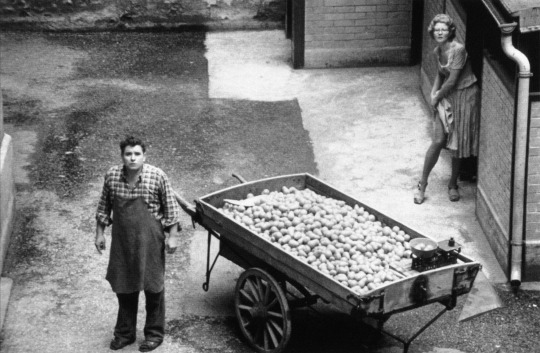
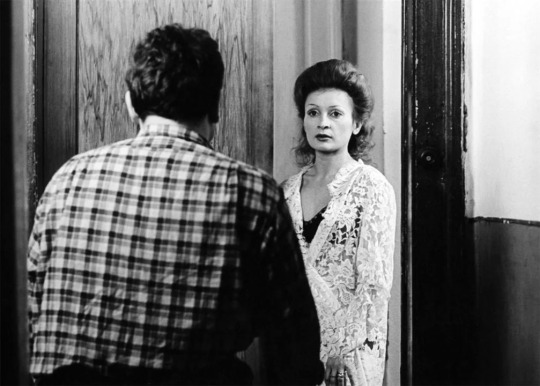
#händler der vier jahreszeiten#the merchant of four seasons#rainer werner fassbinder#1972#irm hermann#ingrid caven#hans hirschmüller
2 notes
·
View notes
Photo
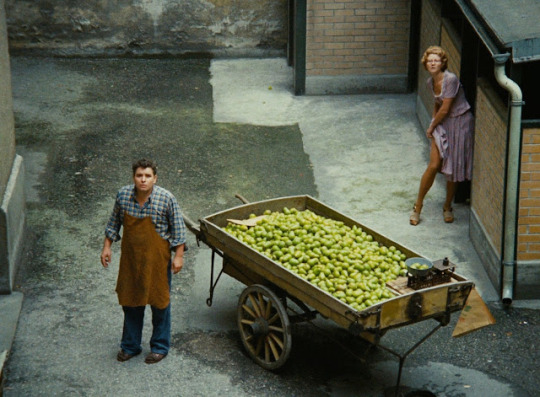
Hans Hirschmüller and Irm Hermann in The Merchant of Four Seasons (Rainer Werner Fassbinder, 1972) Cast: Hans Hirschmüller, Irm Hermann, Hanna Schygulla, Klaus Löwitsch, Karl Scheydt, Andrea Schober, Gusti Kreissl, Ingrid Caven, Kurt Raab, Heidi Simon. Screenplay: Rainer Werner Fassbinder. Cinematography: Dietrich Lohmann. Production design: Kurt Raab Schlubby little (much is made of how much shorter he is than his wife) Hans Epp (Hans Hirschmüller) joined the Foreign Legion after washing out of the Munich police force for receiving a blowjob from a prostitute he had arrested, and now sells fruit from a pushcart he trundles through the courtyards of apartment houses. He is the object of scorn from his family because he never found a white-collar job, unlike his upwardly mobile brother-in-law and his intellectual sister Anna (Hanna Schygulla). His wife, Irmgard (Irm Hermann), assists him in the fruit-selling business, working from a street stall, but it's clear that their marriage is troubled -- she spies on him at work, counting the minutes that he takes to deliver a bagful of pears to the woman he once proposed to. (She turned him down.) Even his mother (Gusti Kreissl) doesn't love him: When he returns from the Foreign Legion and tells her that the friend who enlisted with him was killed, she retorts, "The good die young, but you come back." When he suffers a heart attack, Irmgard cheats on him while he's in the hospital, and then later lets him hire the man she slept with to take over the heavy-lifting part of the job. Despite all that's stacked against him, Hans manages to make a go as a merchant, but just as his family begins to praise him instead of dumping on him, he sinks into a deep depression and winds up drinking himself to death. If this all sounds terribly heavy-handed, it's lifted out of the suds in precisely the way Douglas Sirk made his films rise about their soap-operatic plots with sharp-eyed direction, flashes of wit, and sly social comment. The comparison to Sirk is an obvious one: Rainer Werner Fassbinder's breakthrough film was inspired by his study of the Hollywood master, whom he deliberately set out to imitate and, I think, managed to excel, if only because he wasn't handicapped by the money-making concerns and censorship of American film. There are some delicious performances, not only from Hirschmüller as the sad-sack Hans and Hermann as his sly helpmeet, but also from Schygulla as the somewhat sympathetic Anna. And the film ends with one of the most chilling exchanges in any Fassbinder film, as Irmgard and Harry (Klaus Löwitsch), Hans's old Legionnaire buddy who has gone to work for him, drive away from the funeral and she proposes a business-like marriage to him. His terse reply, "Okay," perfectly sums up the emotionless, mercantile tone that pervades the film.
5 notes
·
View notes
Text
Writer Christine Smallwood on a 2023 Semiotext(e) publication: Fassbinder Thousand of Mirrors, by Ian Penman. Review published in 4Columns.
This is a person for whom the concept of rest was theoretical at best. [...] Fassbinder worked at a manic, heroic, grueling pace, churning out as many as three or four films a year.
A “monster of productivity,” writes Ian Penman in the sneakily brilliant Fassbinder Thousands of Mirrors. Also: “a true monster of selfishness.” [...] “Choreographed tantrums and micro-fascism: RWF is at one and the same time beadiest critic and most egregious example,” he writes. But he “met all his deadlines, every one.”
What are these cramped, controlled, semi-hysterical films doing, and how do they do it? What is this mixture of sadomasochistic relationships (RWF: “my subject is the exploitability of feelings”) and aesthetic pleasure, color, light? On these lines Penman is sharp and unsentimental. He notes early on that he does not wish to “sum up” or “watch every last film and give it a mark out of ten.” He’s not that interested in writing about individual films at all. About Fear Eats the Soul he says only (but isn’t this everything?) that it is “a series of precise framings of people on thresholds.”
Thousands of Mirrors has style to burn. It has no angst of big questions and puts itself under no burden to answer them. “What kind of being is being on film? What kind of being is being an image?” reads one fragment, in its entirety.
“We must never lose sight of visual pleasure, never forget just how beautiful his films could be.” Underscore that. Has anyone ever made a dead body in a station, having its pockets picked, look so good? Has any neon light ever blinked as forlornly, as pinkly, as the one in Franz Biberkopf’s apartment? Has anything ever been lovelier, or sadder, than Ingrid Caven lying naked in that tacky bedroom while Hans Hirschmüller mopes beside her?
Fassbinder, famously, preferred to shoot scenes only once. He made art as life makes us—at one go, one chance for each take. This technique, more than anything else, explains the energy in his work. Even in the most frozen and unnatural of his shots, there is some intensity, a concentrated desire to make something happen.
0 notes
Photo
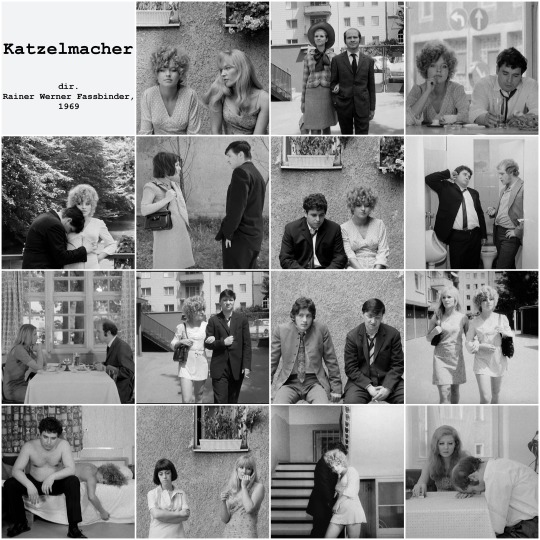
Katzelmacher
directed by Rainer Werner Fassbinder, 1969
#Katzelmacher#Rainer Werner Fassbinder#R.W. Fassbinder#movie mosaics#Hanna Schygulla#Lilith Ungerer#Irm Hermann#Peter Moland#Hans Hirschmüller#Doris Mattes#Rudolf Waldemar Brem#Harry Baer#Elga Sorbas
15 notes
·
View notes
Text










Alice in the Cities (1974)
Director - Wim Wenders, Cinematography - Robby Müller
"Taking pictures is a way of proving things. Waiting for the image to develop, I was often filled with a strange unease. I could hardly wait to compare the picture with reality. But comparing them wouldn't reassure me either. As the still images were always overtaken by reality..."
#scenesandscreens#alice in the cities#wim wenders#robby müller#rüdiger vogler#Yella Rottländer#lisa kreuzer#Edda Köchl#Ernest Boehm#Sam Presti#Lois Moran#Didi Petrikat#Hans Hirschmüller#sibylle baier#chuck berry
67 notes
·
View notes
Text
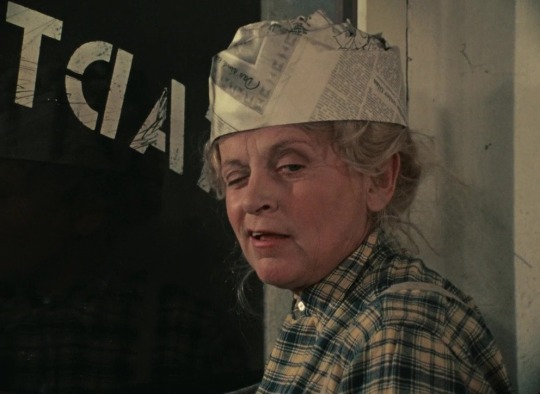

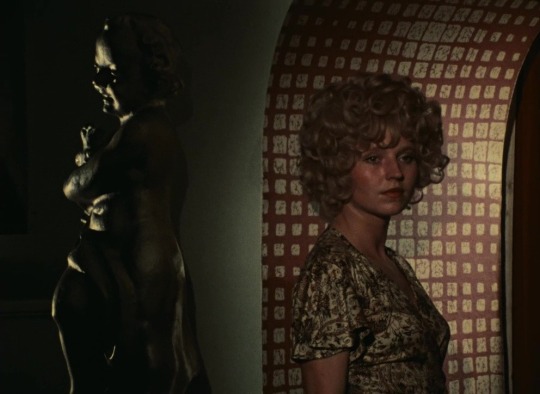


Acht Stunden sind kein Tag: Oma und Gregor (1.2, WDR, 1972)
"In any case, it would be proper if the tram cost nothing."
"Nothing. That's nothing we can hope for."
"Why should that be? I pay my taxes."
"You don't pay any taxes."
"Yes, but other people do."
#acht Stunden sind kein tag#Eight hours don't make a day#rainer werner fassbinder#Oma und Gregor#Westdeutscher Rundfunk#1972#Luise Ullrich#Werner Finck#Gottfried John#Hanna Schygulla#Anita Bucher#Wolfried Lier#Irm Hermann#Rainer Hauer#Hans Hirschmüller#Kurt Raab#Renate Roland#Andrea Schober#Herb Andress#Rudolf Waldemar Brem#Rudolf Lenz#Thorsten Massinger#A more straightforwardly comic episode than the first (and genuinely really quite funny) as we follow Grandma and her new beau as they try#To secure a new apartment together. Ullrich's Oma is a firebrand: a fierce advocate for social responsibility and class consciousness but#Also a helplessly mischievous old lady who simply can't avoid getting into scrapes and causing chaos. Finck's Gregor is a beautifully drawn#Character and performance: an endlessly bemused and passive man caught up in the whirlwind that is grandma (there are several moments where#She asks 'Where would you be without me?' clearly rhetorically but you can almost see the wistful thought cross his eye that he might still#Be sat on that park bench in ep 1 reading Lawrence). A very clever script which puts the shenanigans in the foreground but through showing#The impact that grandma has on the other characters allows us to see those stories and personalities develop and continues to explore ideas#About labour relations and the intrinsic rights of a people to basic needs like shelter and child care.
19 notes
·
View notes
Photo
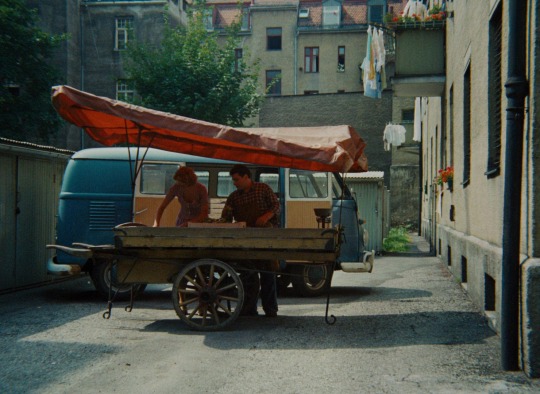
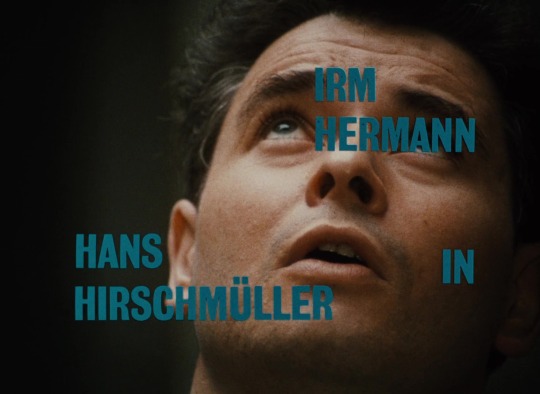
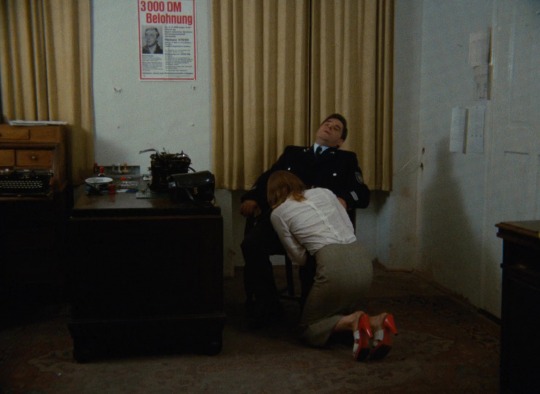

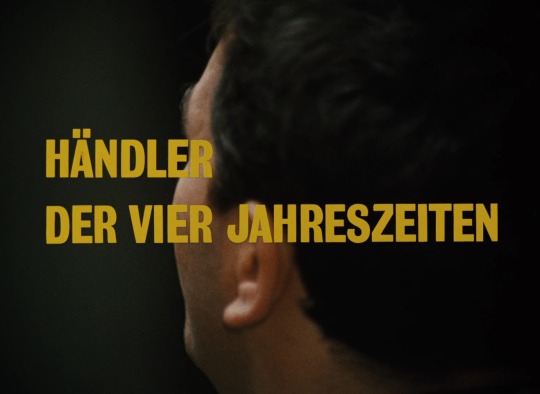


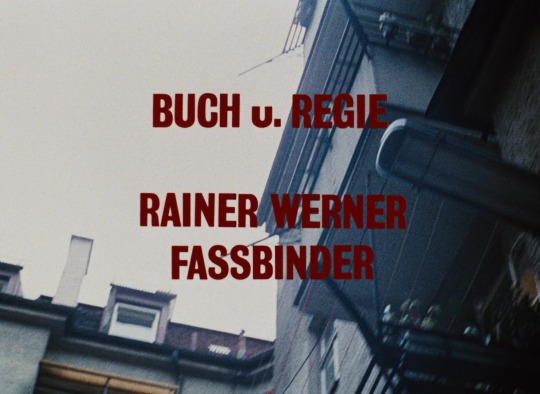
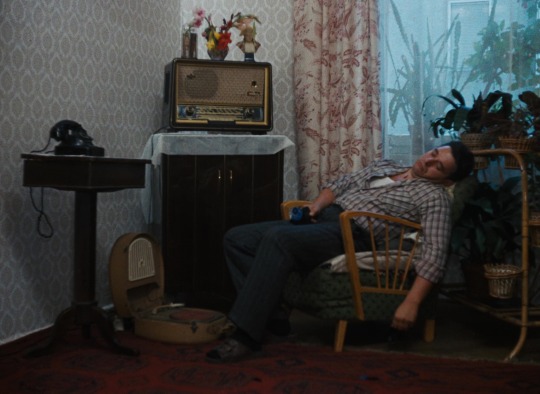
Händler der vier Jahreszeiten (The Merchant of Four Seasons) | Rainer Werner Fassbinder | 1971
#Rainer Werner Fassbinder#Fassbinder#Händler der vier Jahreszeiten#The Merchant of Four Seasons#1971#Hans Hirschmüller#Irm Hermann#Elga Sorbas#Ingrid Caven#Heide Simon#Kurt Raab#Andrea Schober#Gusti Kreissl#Hanna Schygulla#RWF Project
141 notes
·
View notes
Photo

#Alice in den Städten#Alice in the Cities#Wim Wenders#Rüdiger Vogler#Yella Rottländer#Lisa Kreuzer#Edda Köchl#Ernest Boehm#Hans Hirschmüller
6 notes
·
View notes
Photo










acht stunden sind kein tag (wger, fassbinder 72)
#acht stunden sind kein tag#eight hours are not a day#fassbinder#gottfried john#hannah schygulla#Hans Hirschmüller#karl scheydt#peer raben#dietrich lohmann
8 notes
·
View notes
Photo



Rainer Werner Fassbinder, {1972} Acht Stunden sind kein Tag: Franz und Ernst (Eight Hours Don’t Make A Day: Franz and Ernst)
#film#gif#filmgifs#rainer werner fassbinder#acht stunden sind kein tag#eight hours don't make a day#franz und ernst#franz and ernst#gottfried john#Grigorios Karipidis#Hans Hirschmüller#1972#people#men#feature length#tv series#1970s#film diary 2019#films#.gif#west germany#male filmmakers#colour#germany
2 notes
·
View notes
Photo


Das Kaffeehaus | dir. Rainer Werner Fassbinder (1970)
#the coffeehouse#rainer werner fassbinder#hans hirschmüller#speaking truth to power#kurt raab#hanna schygulla#ingrid caven#peer raben
2 notes
·
View notes
Photo
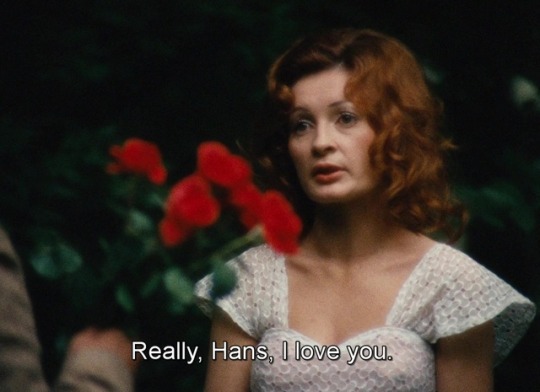
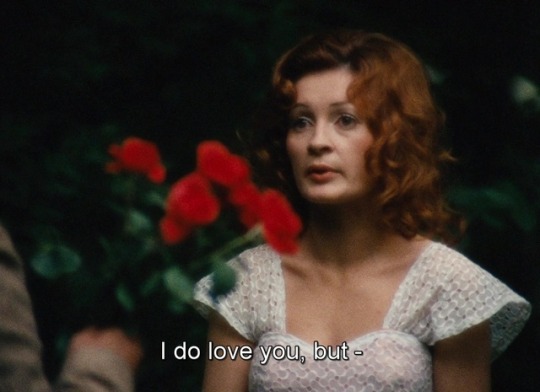
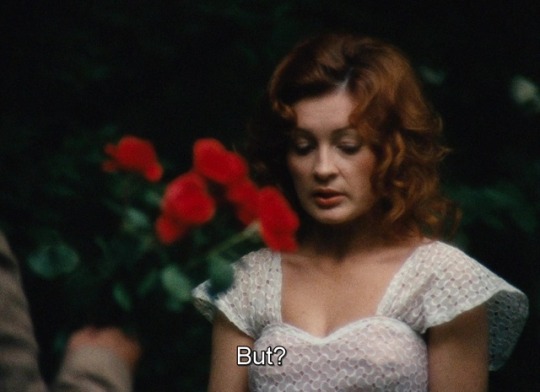
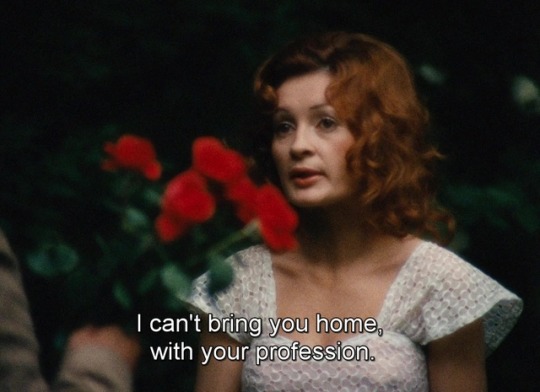



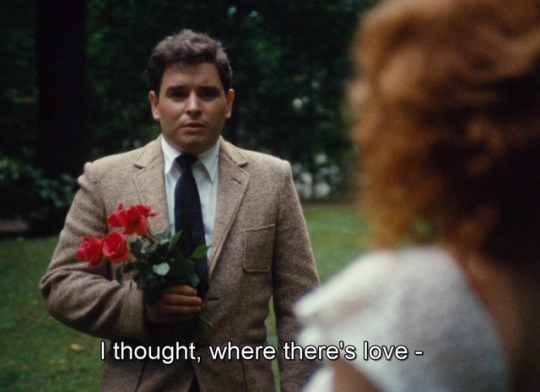


Händler der vier Jahreszeiten (R. W. Fassbinder, 1971)
#händler der vier jahreszeiten#rainer werner fassbinder#r.w. fassbinder#hans hirschmüller#ingrid caven#love#quote
72 notes
·
View notes
Text
#katzelmacher#film#review#rainer werner fassbinder#hanna schygulla#irm hermann#elga sorbas#rudolf waldemar brem#hans hirschmüller#eclipse series#criterion collection#criterion channel
1 note
·
View note
Photo

The Merchant of Four Seasons
directed by Rainer Werner Fassbinder, 1971
#The Merchant of Four Seasons#Händler der vier Jahreszeiten#Rainer Werner Fassbinder#R.W. Fassbinder#movie mosaics#Irm Hermann#Hans Hirschmüller#Gusti Kreissl#Kurt Raab#Ingrid Caven
1 note
·
View note